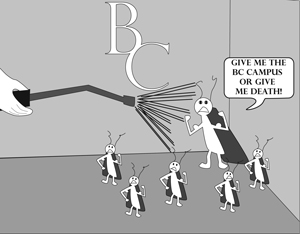Anyone who happens to find themselves on campus in the twilight hours of the day can’t help but notice that a good number of six and eight-legged beings also attend Bakersfield College. In fact, they make their homes here. To help control this micro-invasion, the college has hired a local company to do some spraying, and that has more than a few people up in arms over the supposed dangers of using pesticides on campus.
During the first week of this semester, I was surprised to discover a large black widow in the men’s restroom of the Fine Arts building. I’m not sure what was more disturbing, the fact that a potentially deadly creature was just hanging out in the men’s room, or the fact that this potentially deadly creature was a “she” in the men’s room. But in any case, it should serve to illustrate that there are places that bugs just shouldn’t be.
In 1948, a Swiss chemist named Paul Muller was awarded the Nobel Prize in medicine for figuring out the chemical Dichlorodiphenyltrichloroethane, commonly known as DDT, could be used to kill insects such as mosquitoes and fleas. It was a discovery worthy of such acclaim, not because it reduced the itching and scratching of the prize committee, but because the control of such insects caused a dramatic reduction in diseases like malaria and yellow fever. That’s right, despite the bad press it got in the 1980s, the evil pesticide, DDT, undoubtedly saved countless lives that would have been lost due to mosquito-transmitted diseases, and used responsibly, countries like South Africa continue to use it today with great effect and little harm to the environment.
And let’s not forget the Black Death that swept across Europe in the 14th century. It is estimated that the plague may have killed 40 percent to 50 percent of the population of Europe over a four-year period; over 200 million people dead. While rodents carried the disease, it was transmitted by fleas. Today, pesticides could prevent such an awful outbreak from occurring.
The responsible usage of pesticides is crucial to man’s survival on this planet.
There are from 6 to 10 million different types of insects creeping, crawling, squirming and squiggling over the surface of the Earth, making them, by far, the most abundant form of life in the world, and some scientists estimate that bugs make up 90 percent of the living organisms on this planet. They have to eat the same as we do, and when they get hungry, our farms, orchards and ranches are their fast food.
It is estimated that insects destroy 10 percent to 30 percent of the food crops grown around the world. Without the protection that properly used pesticides provide, those numbers would skyrocket, leading to even more shortages of food and starvation.
The key phrase here is “properly used.” It is abundantly clear that the unregulated usage of pesticides can have detrimental effects on the environment, but that statement can be said about almost anything. I imagine that the unrestricted use of doughnuts would cause a devastating increase in obesity. Unfortunately, self-regulation has never been one of mankind’s strong suits, and the misuse and overuse of pesticides such as DDT has caused damage to the environment in the past.
But as science progresses, and our understanding of our environment improves, safer pesticides are being developed.
Many of the pesticides being used today in residential applications to control such pests as bedbugs and termites biodegrade.
After doing their job, they break down into harmless chemicals, leaving the environment nice and clean for the time when man finally destroys himself, and the insects get their chance at the top of the food chain.
Pesticides are a necessary part of life, unless you want to share your food, your beds, your homes or your Fine Arts building’s men’s room with the little creepy crawlers.





